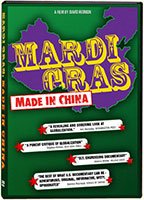 Back to selection
Back to selection
“MARDI GRAS: MADE IN CHINA”
The vastly different worlds of Mardi Gras and Chinese factories meet head-on in Mardi Gras: Made in China. Asking the question where do those beads come from, director David Redmon captures the insane atmosphere of Mardi Gras in New Orleans, where thousands and thousands of strings of beads are bought and given away to revelers. More common than just handing out beads is the ritual that started in the 70s of women flashing their boobs in exchange for a single string of beads.
The doc gives a down-to-earth view of a Chinese factory that makes the beads, showing the ins and outs of the workers’ daily lives, struggling at work. The factory owner is interviewed quite extensively as well, proudly stating how happy the workers are and that they don’t mind doing overtime or being penalized for failing to meet superhuman quotas or talking. Yes, talking. The film also shows he is full of shit.
Director Redmon does a great job dispelling that annoying myth that “oh its okay, ten cents an hour over there is a lot.” The factory is making millions as the workers (ironically, all female) plan strikes to be treated better and have the more apt saying, “its very hard to make a living.”
What I didn’t expect was a humanizing of the revelers – Redmon pulls a great move as he shows footage of the Chinese factory to the people partying on the street. While many partiers “don’t know, don’t care” where the beads come from, many realize the disparity of the two worlds. When the Chinese workers see photos of the New Orleans streets, they have a great reaction you should see for yourself. The doc is modest and straight forward, and all the more powerful for it.
The DVD also contains a 48-minute educational version of the film that is appropriate for PG audiences. A booklet contains a short diary from one of the factory workers. Deleted scenes add even more poignancy to the workers, as well as footage of the revelers you love to hate.
DVD is available from the filmmaker through carnivalesquefilms.com at $24.00 for individuals and $305.00 for educational institutions – the latter version contains many more extras, including commentary by David Redmon and Assistant Producer Ashley Sabin and additional interviews with Noam Chomsky, Michael Hardt, Saskia Sassen, Immanuel Wallerstein, and Mike Presdee; and more….
[AMAZONPRODUCT=B001JK5OBK]

